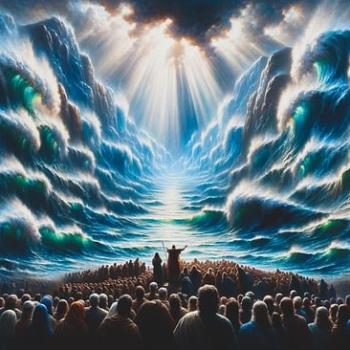“The world is thy ship, not thy home.” – Saint Therese of Lisieux.
They are in the world, but not of the world. So says Jesus of His apostles. What are we to make of this mysterious claim? Is Jesus speaking only of the twelve apostles, or is it true of all Christians?
In the following exposition, I will discuss this rather mysterious aspect of discipleship. I will begin by looking at Jesus’ prayer for His apostles within the context of the Gospel of John. We will see what it means to be a disciple and how we are to live in this world while striving for Heaven.
In, but not of the world
To begin, we must first understand what it means for a Catholic to live in the world but not be of the world. Put very simply, to be in the world but not of the world is to be ever conscious of the fact that this world is not our final home.
The significance for Catholics lies in the knowledge that while they are living in the world, it is not our ultimate destination. Too often, we become enamored of the goods of this world and forget that we are children of God and destined for eternal life.
This duality of being in but not of the world is not lost on Saint Augustine. In The City of God, Augustine writes, “Two cities have been formed by two loves: the earthly by the love of self, even to the contempt of God; the heavenly by the love of God, even to the contempt of self.” (Augustine, Saint. City of God. Penguin UK, 2003.)
The inference then is that, while followers of Christ are in “the earthly city,” their home, their destiny, is the “heavenly city.”
Catholics, then, should understand themselves as pilgrims moving toward their final home. Yet this should not be understood as a directive for all Catholics to become monks or hermits. The balance between being in this world while journeying toward our heavenly home is what being a disciple is all about.
Called to Discipleship
A disciple is a pupil or follower of a teacher. For Catholics, that teacher is God Himself. So that we may understand what Jesus intended for His followers, it is helpful to look at the seventeenth chapter of the Gospel of John. This portion of John is concerned with Jesus’ prayer just prior to His ascent to Heaven.
Though Jesus knows that His followers will be despised and persecuted, He does not ask that the apostles be taken out of the world. Rather, Jesus prays for the apostles to be unified, sanctified, and protected from the Devil (John 17:15-19). The reason why lies in the fact that the apostles (and their successors) were to become witnesses to the salvation wrought by Christ. Moreover, His followers were to build His Church.
Significantly, Jesus’ prayer does not limit itself to the twelve apostles. In John 17:20, Jesus prays for those who come to faith in Him through the apostles. From this, we can assume that those who follow Christ are not to be worldly even while they remain in the world.
Discipleship in a Broken World
Several characteristics can be used when defining a disciple. A fundamental definition would be to say that a Catholic disciple is one who follows Christ and the dictates of the Catholic Church. While that is undoubtedly true, I want to return to Augustine’s insight regarding the two cities.
To be in this world, but not of it, is to love the Heavenly city. Yet, Catholics are not called to wait for entrance into Heaven passively. Rather, to be a disciple involves two fundamental functions. The first function is to “Work out our own salvation,” and the second is that Catholics are to help bring about the Kingdom of God.
Working out our Salvation
Catholic theology asserts, and the Bible supports, the view that salvation is a process, not a one-time event. Saint Paul reminds us that we are “to work out your salvation with fear and trembling.” That is not to say that Catholicism believes in auto-salvation; human beings cannot save themselves from sin. Instead, salvation is a lifelong process requiring Catholics to cooperate with grace.
If it is true that grace perfects nature (as Aquinas argues), and if it is also true that human nature includes free will, then the perfection of our nature (i.e., salvation) requires our consent and cooperation. Cooperation includes participation in the sacraments of the Church, particularly baptism, confirmation, the Eucharist, and confession.
Human nature, corrupted by original sin, will often fall short of holiness. Much like Christ, Who fell three times while carrying His Cross, so too must disciples pick up our own crosses and proceed toward the heavenly city.
Yet, the living out of our faith is not meant only for our own salvation. Rather, Catholics are to be a light in the world. (Matthew 5:14).
Building a Kingdom
In a sense, to be a Catholic is to be a little Christ. As disciples, we are not only to seek our own righteousness but to bring others to God, to be “Workers for the kingdom of God.” But what exactly is the Kingdom of God?
Unlike earthly kingdoms, the kingdom of God is not a geographic location. Instead, it is the person of Jesus. Therefore, to build or bring about the kingdom of God is to bring people to Jesus.
It is the proper ordering of creation, which was lost due to original sin. If each human being is in the right relationship with God, he will be in the right relationship with his fellow human beings, indeed, with all of God’s creation.
How, then, are Catholics to accomplish this task? I suggest that it begins at the level of the individual. If the soul is ordered to God, then the body (a person’s passions) will be properly ordered to the soul. Since the soul is the seat of reason, a properly ordered person is one whose reason dictates his actions. Moreover, since reason allows us to know natural law and since natural law is the manifestation of the mind of God, reason enables human beings to conduct themselves in accordance with God’s will.
What then does this proper ordering look like? Since God is love, the properly ordered person will love God with all his heart, soul, and mind and with all his strength, and he will love his neighbor as himself. (Mark 12:30-31). Such a person will actively work to improve the lives of others, but he will also be a model to them.
Conclusion
Catholics are asked to walk a narrow path between being citizens of this world yet wayfaring toward our heavenly home.
To accomplish this task, Catholics must be disciples, every day seeking to increase our holiness while all the while being a light for others in a world gone dark with sin.

















